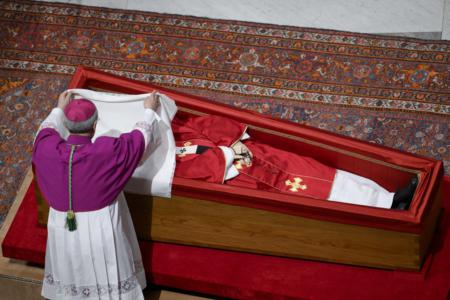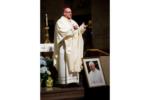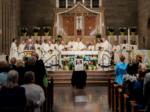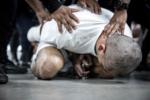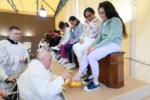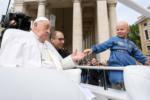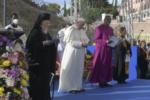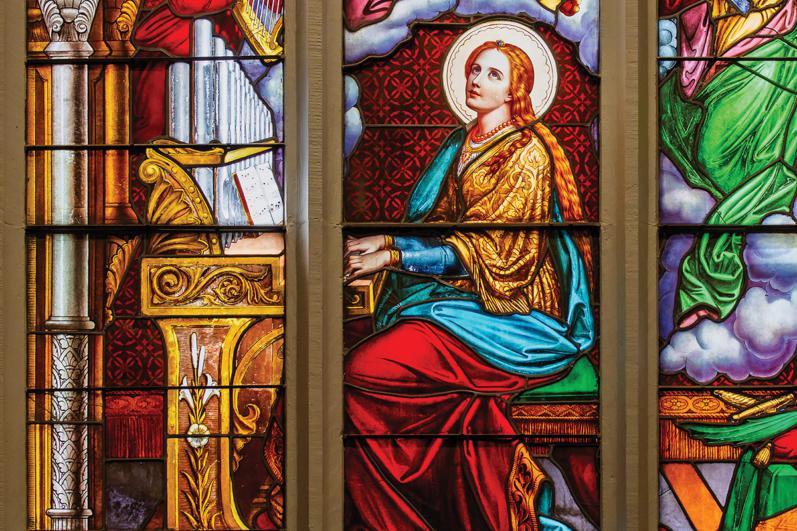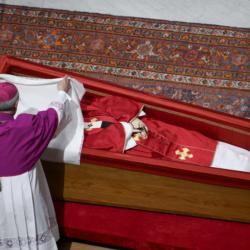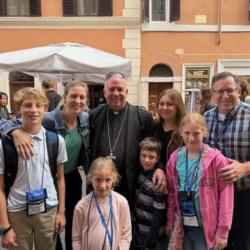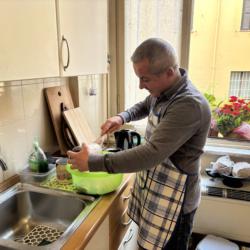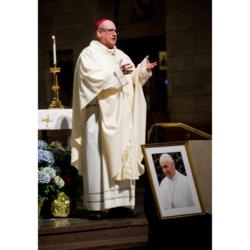St. Cecilia and hope in sacred song
Nov. 22 is a date near and dear to the hearts of pastoral musicians as the church celebrates the feast of St. Cecilia, the patron saint of music and musicians. A third-century virgin and martyr, she is among the saints commemorated in the Roman Canon at Mass. She inspired her betrothed, Valerian, his two brothers, and countless others to conversion. Likewise, St. Cecilia inspires us to transform through music.
There is a saying attributed to St. Augustine: "He who sings once, prays twice." There is great wisdom in this, regardless of its origin. We do know St. Augustine has said, "To sing is a sign of love. The singer of this new song is full of the warmth of God's love." (Sermon 336)
Quite surprising is the context of Augustine's words on singing: the celebration of the dedication of a church. His wisdom teaches us to love in a faith community:
"But Christians do not make a house of God until they are one in charity. The timber and stone must fit together in an orderly plan, must be joined in perfect harmony, must give each other the support as it were of love, or no one would enter the building . . . Therefore, to be raised up from your former state of ruin you must love one another." (Ibid.)
Music is often a deeply personal expression, but in prayer, we are called to sing as one voice in praise to God. This sacrifice of self can bring challenges, especially among merged parishes and diverse communities. But singing in unity also bears much fruit. On Holy Thursday, the offertory antiphon is a familiar and beloved text, "Ubi Caritas -- Where there is charity and love, God is there." The second line is perhaps the more important reminder that we are gathered and united in the love of Christ, even if we are divided in other things. This sentiment echoes St. Augustine's exhortation that we are "one in charity."
Sacred song sung in community is prayer. In this prayer, God dwells among us. Consequently, we are reminded of "Lex Orandi, Lex Credendi, and Lex Vivendi": The rule of prayer forms the rule of belief, which leads to the rule of how we live out our lives -- and quite bluntly, how we treat each other.
What we pray, how we pray -- and sing -- forms our belief, which informs our actions. The faith community is further formed spiritually by what we sing. This power is a call to responsibility for one another. What and how we sing is an act of love and service. For pastoral musicians, each rehearsal is a prayer. Each carefully prepared song is a fulfillment of Jesus' greatest commandment to "Love one another."
The profound power of liturgical music transcends a culture of individualism and propels us toward the transcendent. Vatican II tells us that the texts we sing at Mass "must always be in conformity with Catholic doctrine; indeed, they should be drawn chiefly from holy Scripture and from liturgical sources. (Sacrosanctum Concilium, no. 121) This mandate is not a restriction but a powerful liberation! Consider that at Mass, Jesus Christ is present in the priest, the eucharistic species, and in the word of God. In addition, it is most extraordinary for musicians to realize God is also present in the people "when the church prays and sings, for he promised: 'Where two or three are gathered together in my name, there am I in the midst of them.'" (Matt. 18:20) (SC no. 7)
When we sing the word of God in the pews or in the choir, God is present. This we know and believe!
Whether in your parish choir or the pews, if you think your voice may not make a difference, consider the following from "Gaudium et Spes" ("Joy and Hope" 1965 Vatican II no. 8):
"The Paschal hymn, of course, does not cease when a liturgical celebration ends. Christ, whose praises we have sung, remains with us and leads us through church doors to the whole world, with its joys and hopes, griefs and anxieties."
Remember this always: One never knows the pain, grief, anxieties, hopes, joys, and burdens another soul may carry when entering the doors of our churches and parish communities. When you sing, you will impact people's lives in ways that you likely will never know. You alter their lives for the better and forever. Your song may offer the one bit of hope that someone needs.
Your act of love through song ushers beauty into human hearts. Such beauty is redemptive and salvific. This belief is true for those in the pews, for you give joy and hope to all those around you.
St. Cecilia, pray for us!
RICHARD J. CLARK IS THE ARCHDIOCESAN DIRECTOR OF MUSIC AND DIRECTOR OF MUSIC AT THE CATHEDRAL OF THE HOLY CROSS IN BOSTON.
